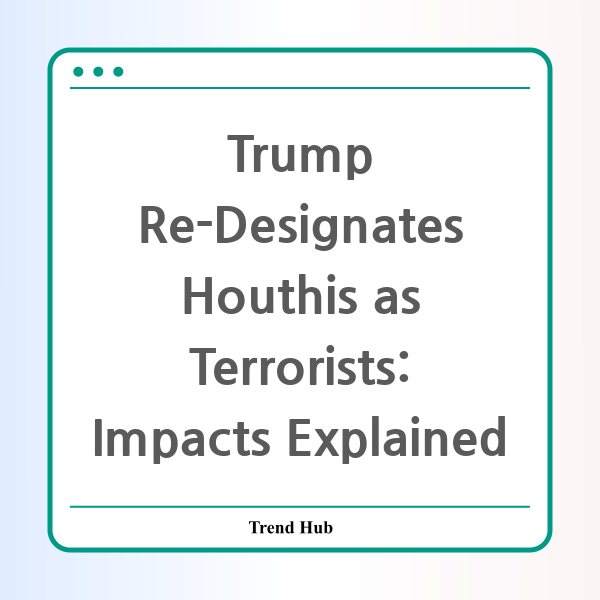* This website participates in the Amazon Affiliate Program and earns from qualifying purchases.

In a significant move, President Donald J. Trump has re-designated the Houthi movement, officially known as Ansar Allah, as a Foreign Terrorist Organization (FTO) on January 22, 2025. This action is a reversal of the Biden administration's previous designation change, raising complex questions about U.S. foreign policy, humanitarian aid, and the ongoing conflict in Yemen.
Trump's Executive Order aims to address escalating security concerns surrounding the Houthis after a series of alarming attacks on U.S. Navy vessels and civilian infrastructure in the region. Since November 2023, the Houthis have reportedly conducted over 100 assaults on commercial ships navigating through the Bab al-Mandeb Strait, often justifying their actions as solidarity with the Palestinian cause amidst the Israel-Hamas conflict. This violent escalation has prompted the U.S. to reassess its stance on the Houthis, with the aim of reinstating stricter economic sanctions and bolstering regional security.
Under Trump's directive, the Secretary of State is tasked with recommending the Houthis’ re-designation as an FTO within 30 days, emphasizing a firm U.S. policy to work alongside regional partners to diminish the capabilities and operations of the Houthis. Furthermore, the Executive Order mandates a review of all U.S. aid directed towards Yemen to ensure that no assistance inadvertently benefits the Houthis, a move expected to draw significant scrutiny from humanitarian organizations.
This re-designation indicates a substantial shift in U.S. foreign policy from the previous administration, which had initially dropped the terrorist label in an attempt to allow humanitarian aid to flow into Yemen amid a devastating civil war. Critics from various humanitarian sectors, including Oxfam, warn that this stringent classification will exacerbate the already dire humanitarian crisis in Yemen, complicating aid delivery to a population that has endured years of conflict, famine, and economic collapse.
Trump's order simultaneously signals a commitment to holding the Houthis accountable for their actions while maintaining diplomatic ties with key regional allies like Saudi Arabia and the UAE. Following the announcement, Saudi Arabia expressed intentions to increase investments in the U.S. by $600 million over the next few years, further strengthening the relationship between the U.S. and Gulf nations.
This situation holds significant implications for both Yemen’s future and U.S. foreign relations. As the Houthis have been known to receive support from Iran’s Islamic Revolutionary Guard Corps, the re-designation may also strain U.S.-Iran relations further, igniting discussions on regional power dynamics and security. Additionally, the administration's strategy to combat the Houthis may involve coordinated airstrikes and increased military presence in the region, echoing previous tactics seen during the Biden administration's attempts to counter Houthi aggression.
In conclusion, President Trump’s decision to re-designate the Houthis as a Foreign Terrorist Organization underscores the complex interplay between military strategy, humanitarian aid, and international diplomacy. As the situation continues to evolve, the world watches closely to see how these developments will affect the humanitarian landscape in Yemen, U.S. foreign policy, and regional stability.
* This website participates in the Amazon Affiliate Program and earns from qualifying purchases.